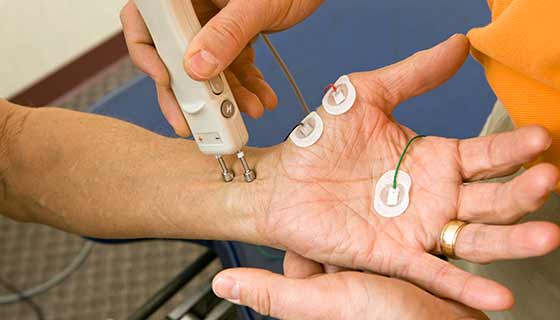Have Any Questions?
+91 77 9849 9977
Visit Us At
103, Shivom Regency, Baner Rd, Pune
+91 77 9849 9977
103, Shivom Regency, Baner Rd, Pune
A nerve conduction study (NCS) also called a nerve conduction velocity test (NCV) is a measurement of the amount and speed of conduction of an electrical impulse through a nerve. NCS can determine nerve damage and destruction which cause the muscles to react in abnormal ways.
The test may be performed by a NCS technologist or a doctor. During the test, the nerve is stimulated, usually with surface electrode patches attached to the skin. Two electrodes are placed on the skin over the nerve. One electrode stimulates the nerve with a very mild electrical impulse and the other electrode records it. The resulting electrical activity is recorded by another electrode. This is repeated for each nerve being tested.


NCS is often used along with an EMG to tell the difference between a nerve disorder and a muscle disorder. NCS detects a problem with the nerve, whereas an EMG detects whether the muscle is working properly in response to the nerve’s stimulus.
Diseases or conditions that may be checked with NCS include:
Guillain-Barré syndrome. A condition in which the body’s immune system attacks part of the peripheral nervous system. The first symptoms may include weakness or a tingling sensation in the legs.
Carpal tunnel syndrome. A condition in which the median nerve, which runs from the forearm into the hand, becomes pressed or squeezed at the wrist by enlarged tendons or ligaments. This causes pain and numbness in the fingers.
Charcot-Marie-Tooth disease. An inherited neurological condition that affects both the motor and sensory nerves. It causes weakness of the foot and lower leg muscles.
The voltage of the electrical pulses used during an NCS is considered very low. Risks depend on your specific medical condition. Be sure to discuss any concerns with your healthcare provider before the procedure.
Certain factors or conditions may interfere with the results of NCS tests. This includes damage to the spinal cord, severe pain before the test, and body temperature. Tell your healthcare provider if you have a cardiac defibrillator or pacemaker, as precautions may need to be taken.
The paste used to attach the electrodes will be removed from your skin.
After the test, you may return to your previous activities, unless your healthcare provider advises you differently. Your healthcare provider may instruct you to avoid strenuous activities for the rest of the day.
Your healthcare provider may give you other instructions after the procedure, depending on your situation.

Mail Your Resume At : drpriyankaneuro13@gmail.com